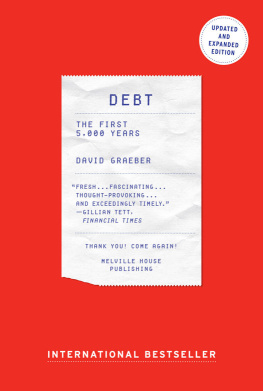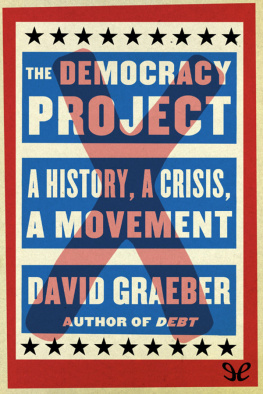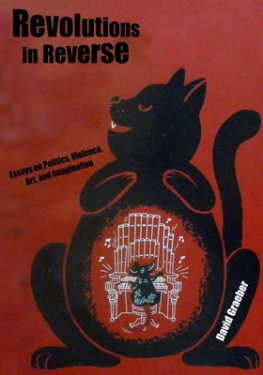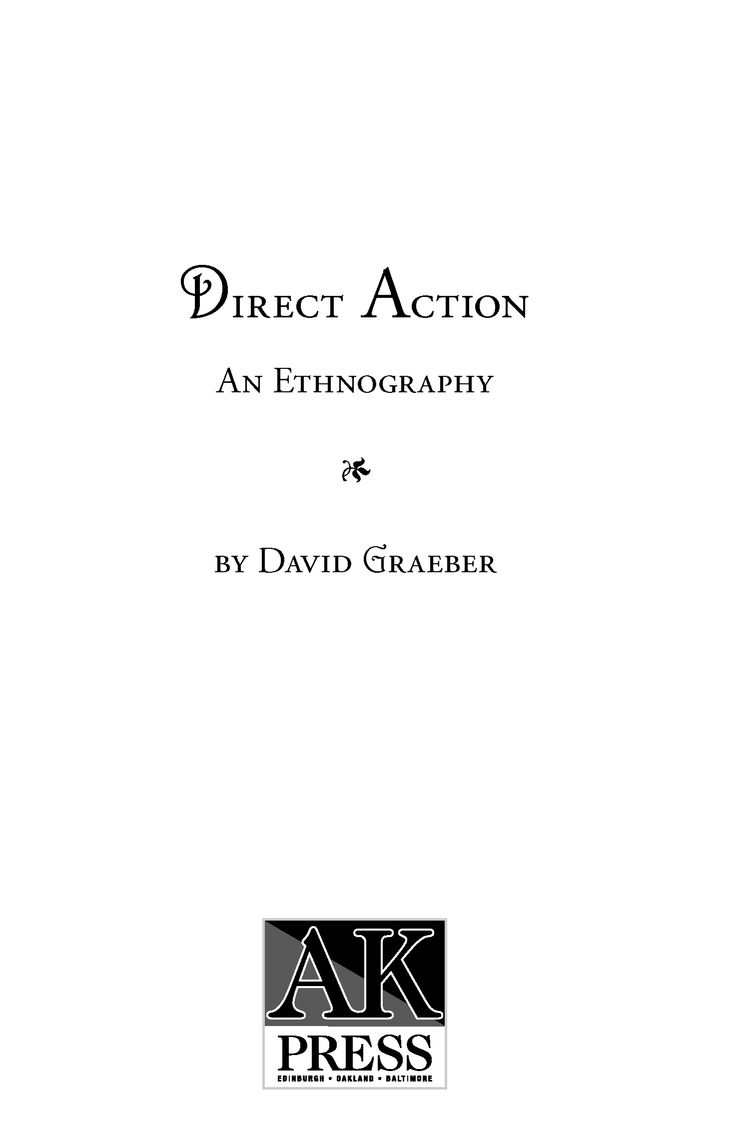Table of Contents
PREFACE
DIRECT ACTION, AN ETHNOGRAPHY
A book this size is unusual nowadays. It was certainly not my initial plan. When I first decided to begin writing up some of my experiences of direct action from an ethnographic perspective, I actually had intended to write a fairly short book. But the more I wrote, the more the topic seemed to grow. I realized I was faced with a common dilemma of ethnographic writing: points that seem simple and obvious to anyone who has spent years inside a given cultural universe require a great deal of ink to convey to someone who hasnt. Something similar had happened to me when I returned to Chicago from my dissertation research in Madagascar, many years ago. I remember fretting over just how much I had to say. I felt I had at best two or three really interesting points to make about the community Id been studying. Then the moment I started writing, I realized that to explain any one of those points to someone who was not themselves from a rural Malagasy community would require several hundred pages. By the time I was done writing, I also realized that most readers would probably find the exposition much more interesting, all in all, than whatever I originally thought was the point.
Call this book, then, a tribute to the continued relevance of ethnographic writing. By ethnographic writing, I mean the kind that aims to describe the contours of a social and conceptual universe in a way that is at once theoretically informed, but not, in itself, simply designed to advocate a single argument or theory. There was a time when the detailed description of a political or ceremonial or exchange system in Africa or Amazonia was considered a valuable contribution to human knowledge in itself. This is no longer really the case. An anthropologist actually from Africa or Amazonia, or even some parts of Europe, might still be able to get away with writing such a book. Presently, the academic convention in America (which a young scholar would be unwise to ignore) is that one must pretend ones description is really meant to make some larger point. This seems unfortunate to me. For one thing, I think it limits a books potential to endure over time. Classic ethnographies, after all, can be reinterpreted. New oneshowever fascinatingrarely present enough material to allow this; and what there is tends to be strictly organized around a specific argument or related series of them.
Therefore, let me warn the reader immediately: there is no particular argument to this bookunless its, that the movement described within is well worth thinking about. This does not mean it does not contain theoretical arguments. Over the course of it, I make any number of them: whether about the ideological role of large heavy objects, the political implications of the word opinion, the similarity of writing news stories and Homeric epic composition, or the cosmological role of the police in American culture. What makes this an ethnographic work in the classic sense of the term is that, as Franz Boas once put it, the general is in the service of the particularaside, perhaps, from the final reflections. Theory is invoked largely to aid in the ultimate task of description. Anarchists and direct action campaigns do not exist to allow some academic to make a theoretical point or prove some rivals theory wrong (any more than do Balinese trance rituals or Andean irrigation technologies), and it strikes me as obnoxious to suggest otherwise. I would like to think that, as a result, the interest of this book might also endure not only for those motivated by historical curiosity, who wish to understand what it was actually like to have been in the middle of these events, but to ask the same sort of questions the actors in it were raising, about the nature of democracy, autonomy, and possibilitiesor for that matter, dilemmas, limitationsof strategies of transformative political action.
SOME WORDS OF HISTORICAL CONTEXT
Enough time has passed since the breathless days of 2000 and 2001 that one can begin, perhaps, to see that historical moment in a little bit of perspective. That period, it is now clear, marked a certain watershed for global neoliberalism. These were the years in which the Washington Consensus of the 1990s was shattered. It happened very quickly. In fact it is a testimony to the effectiveness of direct action that it took only about three years of large-scale popular mobilizations in order to do so.
It is sometimes hard to remember, nowadays, just what the days of the Washington Consensus were like. Perhaps it might be best to start then with a word of context, to help understand why it was that the Zapatista rebellion in 1994 served as such a catalyst for the global movement against neoliberalism that followed, and why that movement came to take the form it did.
THE MOMENTARY SUSPENSION OF HISTORY
The years just before the Zapatista rebellion in Chiapas announced itself to the world were probably the most depressing time to be a revolutionaryor even, dedicated to the ideals of the Leftin living memory. It wasnt the collapse of the Stalinist regimes in Eastern Europe that was depressing; most radicals were glad to see them go. What was depressing was what happened afterwards. With Stalinism dead, most Marxists expected to see a renaissance of more humane forms of Marxism. Social democrats believed that they had finally won the argument with the revolutionary Left and expected to shepherd the former subjects of the Soviet bloc into their fold; a reasonable expectation, since when polled, most of the population of Central and Eastern Europe said they wanted to model their new economies on Sweden. Instead, they got shock therapy and the most savage form of unrestricted capitalism. In almost every way, the world seemed to be heading for a nightmare scenario. The romantic image of the guerilla insurrectionary, which captured so many imaginations in the 1960s, was cascading into a kind of obscene self-parody. Already in the 1980s, the Right, which had been arguing for years that guerilla insurgencies in places like Vietnam, or Zimbabwe, or El Salvador were not spontaneous but fiendish schemes created by foreign ideologues, began to put their own theories into practice, with the US and South African intelligence agencies creating guerilla armies like the contras or RENAMO to sic on leftist regimes. At the same time, existing Marxist guerilla movements from Columbia to Angola that had begun full of high-minded rhetoric were increasingly prone to become pure bandit kings, or nihilistic armies without any cause beyond their own rebellion (those which held to the old ideal of social transformation, like the Shining Path in Peru, seemed if anything even worse). Liberation movements everywhere were transforming into vicious ethnic wars. Then came the wave of genocide, of which Rwanda and the former Yugoslavia were only the most dramatic and visible.
On a dozen interlocking registers simultaneously, the emerging pattern seemed catastrophic. It seemed like it would go something like this: On an international level, capitalism was transforming itself into a revolutionary force. Abandoning the welfare-state version of capitalism that had actually won the Cold War, the old Cold Warriors and their corporate sponsors were demanding a pure, no-holds-barred, free-market version that had never actually existed, and were willing to wreak havoc on all existing institutional social arrangements in order to achieve it. All this involved a kind of weird inversion. The standard right-wing line, since at least the 1790s, had always been that revolutionary dreams were dangerous precisely because they were utopian: they ignored the real complexity of social life, tradition, authority, and human nature, and dreamed of reshaping the world according to some abstract ideal. By the 1990s, the places had been completely reversed. The Left had largely abandoned utopianism (and the more it did so, the more it shriveled and collapsed), and even as they did so, the Right picked it up. Free-market reformers overnight began declaring themselves revolutionariesthe problem was, they did so as the worst sorts of Stalinists, essentially telling the worlds poor that science had proved there was only one way to go forward in history, that this was understood by a scientifically trained elite, and that, therefore, they had to shut up and do as they were told because, even though their prescriptions might cause enormous suffering, death, and dislocation in the present, at some point in the future (they were not sure quite when) it would all lead to a paradise of peace and prosperity. The fact that the science itself had shifted from historical materialism to free-market economics was a fairly minor detail; anyway, it makes it easier to explain how former Stalinists from Romania to Vietnam found it so easy to simply switch hats and declare themselves neoliberals. Meanwhile, as structural adjustment policies stripped away what small social protections had existed for the poorest inhabitants of the planet, propaganda and statistical manipulation had become so effective that most mainstream Americans who paid attention to such matters were convinced that conditions for the worlds poorest were actually improving, and not just in areas like East Asia that had mostly refused to adopt neoliberal policies.












